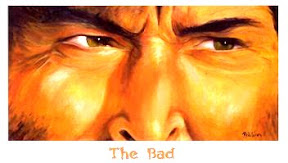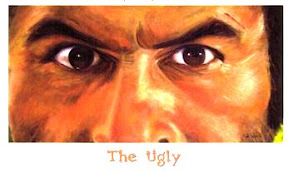
I love the beauty of Jenga. Like Google, it's simple and it works.
Simplicity has a purity about it. Don't knock it. Behind its functionality and its look and feel there will be some hard thinking.
'Keep it simple, stupid'. (K.I.S.S) may be a training cliche but there is considerable truth in it.
I've now had three years here at the OU and here on this Student Blog platform (short of five days, first post 6th Feb 2010).
I've been working on my ideas regarding learning and e-learning design in particular Courtesy of THE OU hosted OLDs MOOC 2013 (Online Learning Design - Massive Open Online Course)
I'm experiencing what feels like undertaking an 8 week written examination - the contents of my brain are being pushed through the cookie cutter.
And out comes this:
The Good, the Bad and the Ugly
(Of course I had shut down for the gadgets for the day and was brushing my teeth when this came to me).

The Good
Learning events or activities, moments that make the participant smile, think, reflect, nod in agreement, understand, be informed and generally feel good about the world and this particular learning experience. Hit them with some of this, as the say so succinctly across the Atlantic - at the 'get go'.

The Bad
The effort required and built into the learning. OK, we want them to love this too, and you can if you're 'in the flow', have done your work, have wrestled with what you didn't understand, asked for help, listen to fellow students, gone out of your way to do extra reading and research until you have it, one way or another.
There needs to be assessment.
An assignment is a soft assessment to me - though like everyone I have terrible days when the thing just slips through my fingers like a snowball on the beach. A dissertation or end of module assignment is tougher, but tough and 'bad' in a certain way - like commitment to a triathlon. And a good analogy as working on and developing three issues at 2,000 words a pop is about right. And you won't get far if you leave training to the week before. It's a slow burn.
The 'bad' has to be the written examination.
They have to be hated and feared, and like learning lines for that school play, you have to get it right on the night (or day). And what do you do if you act? You have good lines to learn, you learn and rehearse your lines and you practice, and do a test run or two. The curtains going up is the equivalent of your turning the examination paper over. I feel the fear from a year ago - April 2012. I hadn't sat a written exam in 30 years. All my undergraduate and school-boy fears came back. I used rusty techniques that had last seen service during my first degree.
Bad is good. You want to do everything not to feel like you are naked on stage - a dream we all have when faced with such an 'exposing' test?

The Ugly
Shock 'em. Not scare the witless. Have up your sleeve some smart stuff. Whether an idea or the technology offer a creepy and certainly memorable surprise.
Boring a student into making a fact or issue stick is like throwing mud at a brick wall - it'll stick, it'll coagulate and build up, but is easily washed away in a shower and destroyed in a storm.
Use storytelling techniques perhaps, better still, follow the pattern of a ghost story.
Scare them? I'm back on fear I guess.
We humans are fearful of many things and will go out of our way to avoid, run away or confront our fears. As I said, the idea here isn't to lose your students, but to empathise with them, understand the ugly side of their learning experience then help them confront their worst fears. It is ugly having to tackle the parts of a subject that stink, but inevitably these are the blocks at the base of JENGA.
So can I apply it? And can I go back to bed now?
Which leads me to another theme - we no longer simply bring work home with us, we take it to bed and sleep with it. If this pisses you off then let me introduce you to 'working with dreams'. If you are prepared to get up for an hour in the dead of night, or can flick on a light without invoking divorce then scribble stuff down to catalyse the thought in the morning. Can work wonders, can produce nonsense, can just be some things you need to put on the supermarket shopping list ... or another dream of being naked on the stage, not knowing your lines and needing the lo but all the exits are locked and the orchestra has stopped and you have to say something.
Which, courtesy of the wonders of the mind, has me in the front row of a performance of The Tempest at the University Theatre, Newcastle when I was 13 or 14. Caliban was naked, covered in mud and wearing a prosthetic erect penis.
HORROR!
P.S. And give me 20 minutes searching the Internet and I will be able to name the actor, date the show and possibly even find a picture. Perhaps you'd like to have a go. But before you do so, be very fearful of what the search terms you use might throw up.
P.P.S. It may have been David Suchet, with Juliet Stevenson or some such as Aerial. The performance was in 1974, possibly a precursor to the RSC doing a Newcastle Tour every March at the Theatre Royal and Gulbenkien. It may have been Jim Carter. Or none of these!